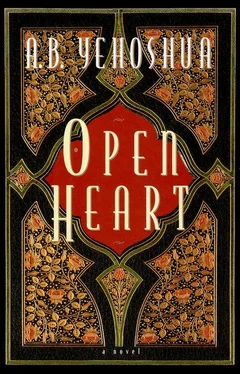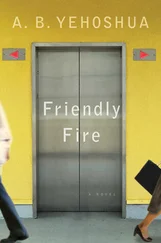A. Yehoshua - Open Heart
Здесь есть возможность читать онлайн «A. Yehoshua - Open Heart» весь текст электронной книги совершенно бесплатно (целиком полную версию без сокращений). В некоторых случаях можно слушать аудио, скачать через торрент в формате fb2 и присутствует краткое содержание. Год выпуска: 2014, Издательство: Peter Halban, Жанр: Современная проза, на английском языке. Описание произведения, (предисловие) а так же отзывы посетителей доступны на портале библиотеки ЛибКат.
- Название:Open Heart
- Автор:
- Издательство:Peter Halban
- Жанр:
- Год:2014
- ISBN:нет данных
- Рейтинг книги:3 / 5. Голосов: 1
-
Избранное:Добавить в избранное
- Отзывы:
-
Ваша оценка:
- 60
- 1
- 2
- 3
- 4
- 5
Open Heart: краткое содержание, описание и аннотация
Предлагаем к чтению аннотацию, описание, краткое содержание или предисловие (зависит от того, что написал сам автор книги «Open Heart»). Если вы не нашли необходимую информацию о книге — напишите в комментариях, мы постараемся отыскать её.
Open Heart — читать онлайн бесплатно полную книгу (весь текст) целиком
Ниже представлен текст книги, разбитый по страницам. Система сохранения места последней прочитанной страницы, позволяет с удобством читать онлайн бесплатно книгу «Open Heart», без необходимости каждый раз заново искать на чём Вы остановились. Поставьте закладку, и сможете в любой момент перейти на страницу, на которой закончили чтение.
Интервал:
Закладка:
The singing below increased in volume, and the simple but unfamiliar tunes became richer and more complex. Two couples dressed in light blue outfits approached the center of the lawn, carrying the chuppah. They inserted the poles into the sockets prepared for them and unfurled the large, richly embroidered canopy, which was big enough for a number of couples to stand beneath at once. After it had been erected, the little choir rose and approached it, singing loudly, as if to encourage the couple, who were embarking on a daring and courageous enterprise, with their optimistic song. And then, from either side of the lawn, the two rabbis appeared, wrapped in prayer shawls; they bowed slightly, with a certain irony, to each other, and they too entered the canopy, while a pretty young girl stepped onto the diving board, walked to the edge, and with a regal gesture invited Eyal and Hadas to come forward and get married.
“I’m afraid it’s going to be pretty ridiculous,” I said to Michaela. “Why?” she protested. “I’ve seen this ceremony before; it always strikes me as beautiful and genuine. If I ever got married, this is how I’d like to do it.” And she went very red, as if alarmed by the words that had slipped out of her mouth. But it was precisely this delicate and sudden blush, which was incompatible with the logical and even somewhat dry tone she had adopted up to now, that touched my heart, and I couldn’t resist reaching out and letting my hand rest gently on her curls. “Tell me,” I said, “the first time I saw you, at the Lazars’, just after you came back from India, your hair was completely shaved — for a minute I even thought you were a boy. So how did your hair grow so quickly?” I saw that she made no attempt to free her head but instead kept it very still, as if to wait and see what the intentions of the hand resting on it were. “I don’t know.” She shrugged her shoulders and laughed. “Apparently it doesn’t know how to do anything else. But look — see how they’re leading Eyal.” And he was really being led, dressed all in white, by two escorts, who were gripping him firmly on either side as he glided between them. One of them was Hadas’s father, and the other, to my surprise, was Professor Shalev, the head of pediatrics at Hadassah, whom Eyal had chosen to fill the place of his father. How clever and cunning of him, I thought to myself after the three of them disappeared under the canopy. Making his boss feel emotionally responsible for him certainly won’t do him any harm when his permanent position comes up for discussion. From the other side of the lawn, escorted by her mother and a woman who was a stranger to me, Hadas approached, walking with a gliding motion in her floor-length white bridal gown. Eyal’s mother apparently didn’t have the strength or the will to lead her daughter-in-law into the canopy, and was still sitting in the same place, pensive, set apart from everyone else, raising her eyes in our direction from time to time as if she really were watching us. And then all of a sudden the lights went out, and someone asked the wedding guests to stand up. Two strong beams of light were shone onto the canopy, brilliantly illuminating the rich colors and shapes of its embroidery. The water in the swimming pool, which had been swallowed up in the darkness, began to glimmer. A profound silence descended, in which it was possible to hear the beating wings of the night birds wheeling in the canyon above us.
“Now we won’t see anything from here,” whispered Michaela in disappointment, and leaned forward in an attempt to see what was happening under the radiant canopy spread out beneath us. Through the opening of her white blouse I caught a glimpse of small, strong breasts projecting freely from her long, lean body. I thought of my parents standing down there with the rest of the guests, enjoying the ceremony but perhaps asking themselves when it would be their turn to lead me under the chuppah. At this moment I wanted to grant their wish and be swallowed up, like Eyal, under a bright canopy like this one, to stand opposite a young woman and listen to the kind of thing now being said by the pair of invisible young rabbis, whose warm words of encouragement rose into the silence of the night. “Actually, I think it’s nicer to watch from up here,” I whispered to Michaela, who had given up on seeing what was going on under the canopy and was sitting by herself, clasping her knees to her chest. “I wanted to see them both from close up” she said, without annoyance but with an acceptance that apparently stemmed not only from her Buddhism, but also from a basic attitude of cool, clear-sighted serenity, which, I suddenly felt, might not only accommodate the strange love in which I was trapped but also appease its pain. “I’m sorry if I’ve kept you up here,” I apologized, in the polite British way to which I was accustomed at home, “but we still haven’t reached the end of the story you promised to tell me. What, if anything, did Einat tell you about me?” A faint smile crossed Michaela’s lips, very different from the one that had captured my heart, not in the least automatic, not brimming over in all directions, but very skeptical, and at the same time kind. And while the marriage ceremony below us reached its climax, she told me that Einat had known nothing about her parents’ plan to descend on her in India and take her home. Someone who had arrived in Calcutta from Bodhgaya had told Michaela about a young Israeli woman lying in the Thai monastery there, very ill with hepatitis. Michaela recognized Einat from the description, and since she assumed that Einat had been infected by one of the people treated in the sidewalk clinic while she was working in Calcutta, she felt morally responsible and went down to Bodhgaya herself to look after her. When she found Einat lying there in her dark little room, yellow and despairing, suffering and scratching, she decided that her parents should be informed so they would come themselves or send someone to get her, but Einat refused to give her the address, as if she wanted to sink even deeper into her illness and wallow in it, perhaps because she was sure that in the end she would get over it by herself. But Michaela was afraid that if she left her there, her condition might deteriorate; she had already noticed her friend’s hidden desire to flirt with death in Calcutta, and therefore, in spite of her belief that everyone was responsible for his own fate, she decided to move up her own departure from India and insisted on getting a letter from Einat to her parents. As soon as she arrived home she hurried to the Lazars’ apartment in Tel Aviv to warn them about their daughter’s condition. But when Einat saw her parents walking into her little room two weeks later, she was not only astonished at the fact that they had made the long, difficult journey for her sake, but also dismayed, since she had no doubt that they would not agree to stay there quietly and look after her till she recovered but would insist instead on dragging her back to Israel with them. Apparently, when she saw a strange young doctor coming in behind them, who dispensed with asking all kinds of irritating questions and knelt down silently beside her to examine her, slowly and thoroughly, her spirits rose, because she immediately felt that she could trust herself to his hands.
“Yes, and so she could!” This sentence may have sounded arrogant, but genuine emotion gripped me as I remembered the dark alcove, the sleeping bag crumpled in the corner, and the two astounded Japanese girls crouching over their little gas burner. “And did she by any chance tell you too about the blood transfusion I gave her in Varanasi?” I asked Michaela eagerly, for there was something in the way she spoke which made me hope that by means of her story I might be able to dispel the mist that still clung not only to my actions but also to my character during the trip to India. “Of course, she told me all about it,” said Michaela. “She claims you saved her life.” I was very moved. I wanted to keep quiet and let these wonderful words sink slowly into my soul, but I couldn’t control myself, and I asked her hesitantly, “And you? How does it seem to you? Like the truth or like an illusion?” She wasn’t surprised by my strange question. A faint smile wrinkled her face, which wasn’t in the least beautiful, but whose great, shining eyes held out a promise of something that was stronger than beauty. “I think you really did save her,” she replied simply, unhesitatingly, and generously, and then I couldn’t control myself any longer, and in great excitement I leaned over and took her in my arms, embracing her warmly with those same hands that Einat had found so trustworthy, careful however not to speak a word of love, in order not to desecrate the true love I bore for that other woman. I contented myself with saying sincerely, “I like you. I like you very, very much,” and taking her curly head between my hands I carefully placed my lips on her eyes. But she, with a movement whose naturalness belied a lot of experience, slid her lips up to mine and drew a real, prolonged kiss out of me, while below us the singing died down, the lawn was flooded with light again, and cries of “Mazel tov!” greeted the couple emerging from under the canopy.
Читать дальшеИнтервал:
Закладка:
Похожие книги на «Open Heart»
Представляем Вашему вниманию похожие книги на «Open Heart» списком для выбора. Мы отобрали схожую по названию и смыслу литературу в надежде предоставить читателям больше вариантов отыскать новые, интересные, ещё непрочитанные произведения.
Обсуждение, отзывы о книге «Open Heart» и просто собственные мнения читателей. Оставьте ваши комментарии, напишите, что Вы думаете о произведении, его смысле или главных героях. Укажите что конкретно понравилось, а что нет, и почему Вы так считаете.












